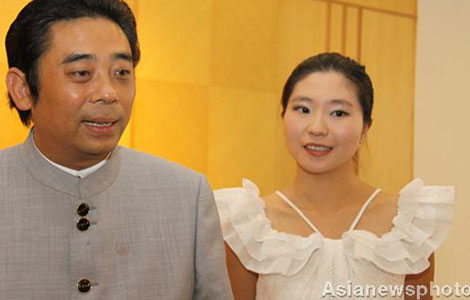Former spokesman looks back on bumpy career
Updated: 2011-08-20 09:02
By An Baijie (China Daily)
|
|||||||||||
BEIJING - Wang Xuming said he "felt like crying but didn't shed a tear" when he ceased being the spokesman for the Ministry of Education three years ago.
Wang, who was the subject of both praise and criticism for outspoken remarks he made during his term in office, which lasted from 2003 to 2008, is now the president of the Language and Literature Press. Unlike Wang's old job, his new one seldom has him working on news release.
"(My work) has totally changed," he told China Daily in an exclusive interview on Thursday. "I don't do much in public these days. Before this, I hadn't ever really thought of doing this kind of job."
In his old position, Wang would keep at least a dozen ties, two suits and several shirts in his office. He also would put a dash of cologne on his clothes before holding news conferences.
All of those habits have changed, largely because he "doesn't have to be in front of the public so much anymore".
Unlike most other officials, Wang would refuse when he was a spokesperson to tell reporters his age, which he said is a private matter. Wang's resume shows that he once worked as a reporter at the China Education Daily and, before that, as a teacher for seven years in a Beijing middle school. He left the newspaper in 1998 and joined the ministry to begin a career in its press office. Five years later, he was appointed spokesman for the ministry.
Subject of controversy
In that position, Wang had a reputation for being an outspoken official who never told reporters "no comment". Wang's remarks on education were often of interest to the public and at times provoked anger.
At a 2006 news conference, Wang said the public should be glad to see that some college graduates choose to raise pigs.
"Well-educated pig farmers will perform miracles in pig raising," Wang said. "The notion that pigs have to be raised by people who are illiterate is a stereotype."
In 2006, the number of Chinese students who graduated from college increased to 4.13 million from 3.38 million the past year. The additional competition made it hard for many of them to find good jobs. In light of that situation, many observers perceived Wang's remarks as being callous, especially graduates who had gone into debt to afford their tuition and who wanted to pay off their student loans as soon as possible.
The public wasn't alone in its anger. Wang said that during his time as the ministry spokesman he would become furious when he saw or read "irresponsible" news reports about himself.
During the National People's Congress session in 2006, Wang told reporters that the high tuition fees charged by some universities are partly caused by the increasing number of parents who only want their children to go to the best schools.
"The places where someone can go to get the best education possible, like Peking University and Tsinghua University, are rare," Wang said. "So it's unrealistic to think that everybody can go to them. It's like shopping. If you are rich, you can buy a suit for 10,000 yuan ($1,565). But if you're poor, you can only go to small shops and buy a suit for 100 yuan."
Wang said those words later appeared in newspapers "without my permission". Some news outlets also misinterpreted his extemporaneous remarks as meaning that "the best universities should only be open to rich students", and that subjected him to a wave of criticism.
Wang said he used to feel upset when he saw that people were cursing him on the Internet. "Someone said he had never seen a man who is as shameless as I am," he said. "Someone else was even more malicious and said 'Why didn't Wang Xuming's mother strangle him when he was born?'."
"Although I was sometimes misunderstood by the public and news media, I still considered reporters to be my friends rather than my enemies, which is a different attitude than many other spokesmen have".
Still speaking out
On July 18, 2008, Wang left his spokesman post and was appointed the president of the Language and Literature Press. Dozens of reporters held a farewell party for him at a karaoke parlor in Beijing, where he was reported to have cried several times.
Although no longer a spokesman, Wang continues to comment on public issues. Only now he does that using blogs and his micro blog.
"In the past, I spoke for the education ministry," he said. "Now I speak for the public."
What brought him back into the headlines was a 6,000-word letter he wrote on July 28 to Wang Yongping, who was fired this week from his post as the spokesman for the Ministry of Railways. In it, Wang Xuming criticized the way Wang Yongping had answered questions about the deadly train crash that had occurred near Wenzhou this past month, saying his words had been "too emotional and strong".
During a news conference held the day after the accident, Wang Yongping incensed the public by saying that the rescue of a 2-year-old girl from one of the wrecked trains had been a "miracle of life". His remarks came among accusations that the railway ministry had called off the rescue operation at the crash site too soon.
On Wednesday, the railway ministry made Wang Yongping the Chinese delegate to the Warsaw-based Organization for the Cooperation of Railways. Wang Xuming said that was an unfair way to treat the spokesman "if the transfer was meant as a punishment".
"I don't think that the whole responsibility for the accident should lie with the spokesman," he said. "And I am afraid that this 'job transfer' for Wang Yongping may cause other spokesmen to be reluctant to speak frankly in the future."
A reporter from China Education Daily who knows Wang told China Daily on condition of anonymity that Wang's sometimes inflammatory choice of words led to the end of his career as a spokesman.
"In current circumstances, public figures who have sharp edges, like Wang, won't be accepted very well either by the public or by some authorities," she said.
Wang Xuming said he doesn't share that opinion.
"Shi Anbin, a professor at Tsinghua University, once said that if the job of being a spokesman in China were to become more professional in the future, Wang Xuming could serve as a lifetime spokesman. That was a great compliment to me."
Hot Topics
Anti-Gay, Giant Panda, Subway, High Speed Train, Coal Mine, High Temperature, Rainstorm, Sino-US, Oil Spill, Zhu Min
Editor's Picks

|

|

|

|

|

|







